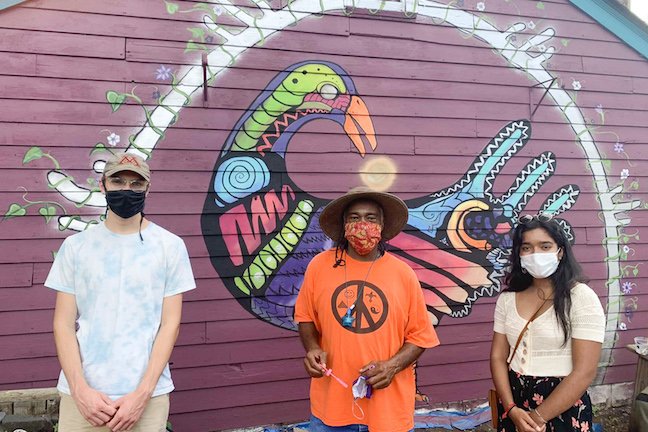Engineers Without Borders lends a hand locally

Above: EWB students Robert Glisky and Sneha Sinha pose with UFGA coordinator Melvin Giles.
Photo credit: Engineers Without Borders - UMN
CSE students fight food and wealth disparities in St. Paul
Editor’s note: EWB's work at the Aurora/St. Anthony Peace Garden is almost complete as of September 1, 2021 (Watch a video tour of the garden at the end of this story). The students will continue working on some miscellaneous projects at the garden, but expand their collaboration with the Urban Farm and Garden Alliance. This fall, they’ll head a few blocks down the road to help install accessible walkways and landscaping, a composting setup, and a water distribution system among other improvements at the Victoria Community Garden in St. Paul.
July 30, 2020
If summer 2020 had been normal, students in the University of Minnesota chapter of Engineers Without Borders (EWB) would be returning to the United States, having just installed a solar-powered cooker in a community in Ethiopia. However, with the COVID-19 pandemic putting their travel plans on hold, the students turned their attention to the Twin Cities community.
UMN EWB is partnering with Urban Farm and Garden Alliance (UFGA), a local organization that promotes environmental and racial justice by giving residents the opportunity to grow their own produce and manage community gardens in St. Paul’s Rondo and Frogtown neighborhoods.
The EWB students will renovate UFGA’s Aurora/St. Anthony Peace Garden, adding a solar-powered greenhouse to extend the growing season and paved pathways to make the garden more accessible. The students will work on the garden design in the fall and hope to implement these initiatives in spring of 2021.
College of Science and Engineering students Sneha Sinha, a junior studying chemical engineering, and Nate Twardock, a sophomore studying mechanical engineering, are co-leading the project.
“Given everything going on right now, I think there’s also a lot to learn about the history of Minnesota and how you can use engineering to tackle those issues,” Sinha said. “We’re planning on using [UFGA’s] resources and their knowledge to also educate our members moving into all of this because in designing and engineering, you always need to be considerate of the humans that will be using the products you’re working on.”
The garden also serves as an environmental learning center for the nearby Maxfield Elementary School. The EWB team plans to use the redesigned garden to educate neighborhood youth about solar energy power.
“There’s obviously tons of problems all around the world, but we can’t really ignore the problems that are going on in our own country and our own communities,” Twardock said. “Obviously the goal of EWB is the ‘without borders’ aspect of that—being able to travel. But also, being able to help in your own community is extremely important.”
Story by Olivia Hultgren
Video edited by Kathryn Richner
Update: One year later—watch the EWB-UMN video tour of the completed garden.
If you’d like to support students at the University of Minnesota College of Science and Engineering, visit the CSE Response Fund webpage.
